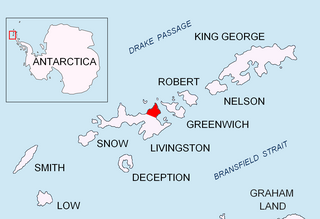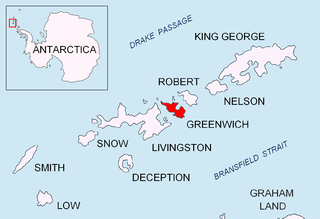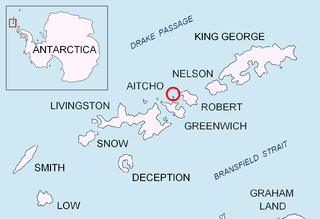
Nikopol Point is an ice-free point on the south coast of Byers Peninsula, Livingston Island in the South Shetland Islands, Antarctica projecting 650 m east-southeastwards into Bransfield Strait and linked by a spit to Vietor Rock to the south. The area was visited by early 19th century sealers who had dwellings at the foothills of nearby Sealer Hill.

Svishtov Cove is a 2.19 km wide cove indenting for 1.48 km the northwest extremity of Ray Promontory on Byers Peninsula, Livingston Island in the South Shetland Islands, Antarctica. it is entered southwest of Essex Point and northeast of Start Point.

Varna Peninsula is a roughly rectangular predominantly ice-covered peninsula forming the northeast extremity of Livingston Island in the South Shetland Islands, Antarctica. It is bounded by Hero Bay to the northwest, by Moon Bay to the southeast, and by McFarlane Strait to the northeast.

Hannah Point is a point on the south coast of Livingston Island in the South Shetland Islands, Antarctica. It forms the east side of the entrance to Walker Bay and the west side of the entrance to South Bay. Surmounted by Ustra Peak to the north, with Liverpool Beach extending between the peak and the tip of Hannah Point. Ice-free area ca. 122 hectares.

Camp Byers is a Spanish seasonal base camp on Byers Peninsula, Livingston Island in the South Shetland Islands, Antarctica. The locality is also designated for use as an International Field Camp. When necessary for scientific research purposes, temporary camping is allowed elsewhere on the protected peninsula under certain conditions.

Sevar Point is a point on the south coast of Byers Peninsula on Livingston Island in the South Shetland Islands, Antarctica situated 1.9 km east-southeast of Devils Point, 2.71 km west of Nikopol Point, and 2.97 km northeast of Long Rock in Morton Strait. It is surmounted by Wasp Hill on the north-northeast, Sealer Hill on the east-northeast, and forms the east side of the entrance to Raskuporis Cove.

Dometa Point is a point on the south coast of Byers Peninsula on Livingston Island in the South Shetland Islands, Antarctica situated 4.3 km west-northwest of Rish Point, 1.2 km southwest of Negro Hill, 4.6 km southeast of Chester Cone, and 4.2 km east-northeast of Nikopol Point.

Vardim Rocks are a group of rocks situated on the south side of Hell Gates, facing Devils Point in the southwest extremity of Byers Peninsula on Livingston Island in the South Shetland Islands, Antarctica. Extending 1.3 km (0.81 mi) in east-west direction. The two principal islets in the group, Demon and Sprite, are extending 420 by 400 m and 270 by 150 m respectively, with surface area of the former 9 hectares. The area was visited by early 19th century sealers.

Elephant Point is a small predominantly ice-free promontory projecting 2 km into Bransfield Strait at the south extremity of the west half of Livingston Island in the South Shetland Islands, Antarctica. The point forms the southwest side of the entrance to Kavarna Cove, and is surmounted by Rotch Dome on the north. Ice-free surface area 109 hectares. The area was visited by early 19th century sealers.

The Dunbar Islands are a small group of islands lying off Varna Peninsula southwest of Williams Point, the northeast extremity of Livingston Island in the South Shetland Islands, Antarctica comprising the islands of Aspis, Balsha, Melyane, Pogledets and Zavala, and several minor islets and rocks. The area was visited by early 19th century sealers.

Triangle Point is the low ice-free tipped point forming the northwest side of the entrance to Shopski Cove in the south coast of Parvomay Neck linking the northwest and southeast parts of Greenwich Island in the South Shetland Islands, Antarctica. The area was frequented by early 19th century sealers operating from Yankee Harbour.

Window Island is a small ice-free island off the north coast of Ray Promontory in the northwest of Byers Peninsula, Livingston Island in the South Shetland Islands, Antarctica. The island has a surface area of 23 hectares and rises to 72 m (236 ft). It was known to the early 19th century sealers operating on Byers Peninsula.

Romeo Island is a rocky island lying off the north coast of Greenwich Island and west of Aitcho Islands in the South Shetland Islands, Antarctica. Extending 1.35 km (0.84 mi) in west-northwest direction and 470 m (510 yd) wide, with a surface area of 44 hectares. The area was visited by early 19th century sealers.

Negro Hill is a conspicuous rocky hill, double-peaked with a small tarn in between, rising to 143 m at South Beaches on Byers Peninsula, Livingston Island in the South Shetland Islands, Antarctica. The area was visited by 19th-century sealers.

Usnea Plug is a volcanic plug, 30 m from base to summit, rising to 117 m in the interior of Byers Peninsula, Livingston Island in the South Shetland Islands, Antarctica. The area was known to 19th century sealers.

Sealer Hill is a hill rising to 91 m in the southwest part of Byers Peninsula, Livingston Island in the South Shetland Islands, Antarctica. It surmounts Nikopol Point and Sevar Point to the east-southeast and west-southwest, respectively. The area was inhabited by 19th century sealers.

La Morenita is a conspicuous rocky hill rising to 93 m in the southwest extremity of Half Moon Island in the South Shetland Islands, Antarctica. It surmounts the Argentine Antarctic base Cámara situated in its northern foothills, Menguante Cove to the northeast and Mugla Passage to the south. The area was visited by early 19th century sealers operating from nearby Yankee Harbour.

Glaciar Rocoso Cove is a small open cove, part of False Bay, Livingston Island in the South Shetland Islands, Antarctica. It is 920 m wide and indenting for 180 m the southeast coast of Hurd Peninsula east-northeast of Binn Peak and south-southwest of Nusha Hill. The area was visited by early 19th century sealers.

Camp Livingston is an Argentine seasonal base camp on Byers Peninsula, Livingston Island in the South Shetland Islands, Antarctica. The area was visited by early 19th century sealers.

Limnopolar Lake is one of the numerous freshwater lakes on the ice-free Byers Peninsula, Livingston Island in the South Shetland Islands, Antarctica. The feature is oval in shape, extending 175 m in southeast-northwest direction and 140 m in southwest-northeast direction. It drains through a 2.7 km stream westwards into Osogovo Bay north of Point Smellie.










